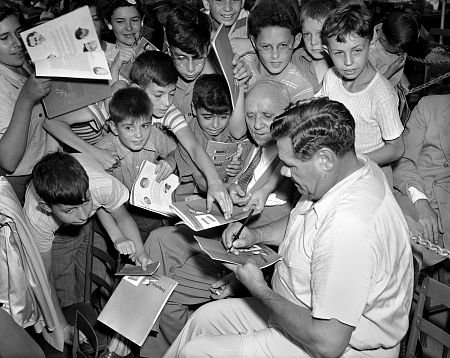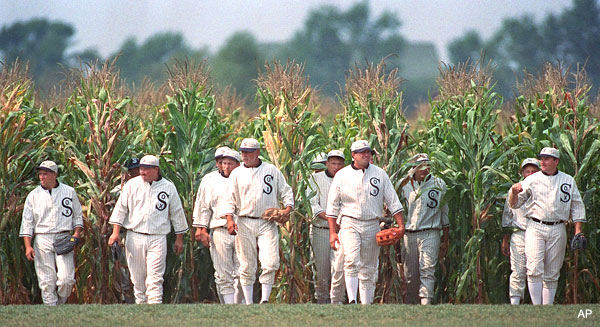

The MLB all-star game was last night. The big game, and the various festivities and events surrounding it (namely, the home run derby) have always been one of the memorable elements of America’s pastime. I’ve always enjoyed all-star games. There’s something to be said about seeing the most talented individuals of a particular sport perform on the same field/court at the same time. All-star games are celebratory in nature–the oohs and aahs over exceptional talent and nostalgia over the rich history and love for the sport. Pass me the cracker jacks would ya?
Of course, All-Stars make the team by way of a vote. There are always the few players who’ve had good starts to the season, or have had notable careers, and yet they weren’t selected. Los Angeles Dodgers’ right fielder, Yasiel Puig, who has had a stellar season thus far, is perhaps the best recent example of these shoulda-beens. For whatever reason, Puig wasn’t All-Star material. No doubt, the nature of the All-Star Game varies from sport to sport–with their own particular segments and backstories that we all love–but the big picture is the same: the best players play, and only the best.
This is something we love. We love to distinguish the really great from average talent. I love to do this. It’s fun for conversation and it’s entertaining to watch. Our proclivity towards distinctions, however minute, is embedded in our very psyche/person. We distinguish good friends from best friends. The most productive on the floor from the average joe and the sluggard; the honest from the liar and so on. Within our own inner-monologue, we stack up the traits of those closest to us, to our own traits. This ploy also has profound consequences on our beliefs about God, more to the point, and how he treats us/what he thinks of us. Oftentimes I find myself imagining my own inner-all-star-team of sorts, all of whom are highly intelligent, well-spoken theology types–Reformers, famous pastors, whoever. Consequentially, so I’ve thought, as a result of their extraordinary gifts, accolades and vocations–God must exceptionally love them. Why wouldn’t he? They are exceptional human beings, worth striving to imitate. Maybe your all-star team is full of missionaries who live in huts. Maybe they’re geniuses or philanthropists or immaculate housewives. Whatever the case may be, you aren’t on the team. I’m not on the team. Our spiritual/emotional all-star team is made up of individuals who possess gifts and attributes we don’t have, or we used to have, or are working to have one day.
It’s helpful to remind ourselves, (again and again, because, to be sure, we will certainly forget) of the good news that, as Brennan Manning said so many times, “we are loved unconditionally as we are, and not as we should be.” While we might serve as little selection committees, propping those who really have it together on our pedestal(s) (the pedestal we wish we were on) distinguishing them from our own mundane little lives, the gospel of grace announces there is no all-star team. In fact, accolades and accomplishments–whether it’s home runs, base hits, strikeouts or even mission trips–simply don’t have a say when it comes to grace: Another’s merits are what we bank on.

COMMENTS
3 responses to “The Best, and Only the Best (and the Rest of Us)”
Leave a Reply













Romans 5: 17 For if, because of one man’s trespass, death reigned through that one man, much more will those who receive the abundance of grace and the free gift of righteousness (justice) reign in life through the one man Jesus Christ.
I am so glad that the gospel is not about “potential” and “possibility” but about what will surely happen because of what God did in Christ. God’s grace is either “possible” or God’s grace is always effective. If grace is only “possible”, then salvation is not by grace, but rather by works.
God’s grace is either according to justice or it is not. If grace is only non-just, then grace is only about the sovereignty of God and not about the justice of God. But if God’s grace is not only about what God “can do” but what God has done in Christ, then God’s grace is not about what you “can have if you accept it.” God’s grace is not about conditionality, not about “could have” or “should have”.
Thanks for a fun post.
(One baseball note: Puig may not have played enough this season to merit inclusion in the ASG.)
Not to nit-pick, but I wonder how helpful it is to “remind ourselves” of the good news. Perhaps what is needed, is for us to hear this good news – over and over because we will certainly forget – as an external word, announced as God’s love poured out for us. This might be part of the reason we need the faith community. It is an external word, that most effectively bears the Gospel good news.
re: Brennan Manning: “we are loved unconditionally as we are, and not as we should be.”
I like this by Douglas John Hall, in The Cross in Our Context; summarized, as it is a statement made in DJ Hall’s typically involved and incisive way:
“The theology of the cross, … is … first of all a statement about God, and what it says about God is not that God thinks humankind so wretched that it deserves death and hell, but that God thinks humankind and the whole creation so good, so beautiful, so precious … that … its fulfillment, its redemption is worth dying for.” page 24
Thanks for the comments, guys!
M- Amen and amen!
P-
I know, but it would’ve been super cool if he would/could have, ya know? Love the quote from Hall and I totally agree with you.
Whether I “remind myself” (of the good news) whenever I start putting together my imaginary all-star team, or it’s “announced” on Sunday mornings, I’ll take both!